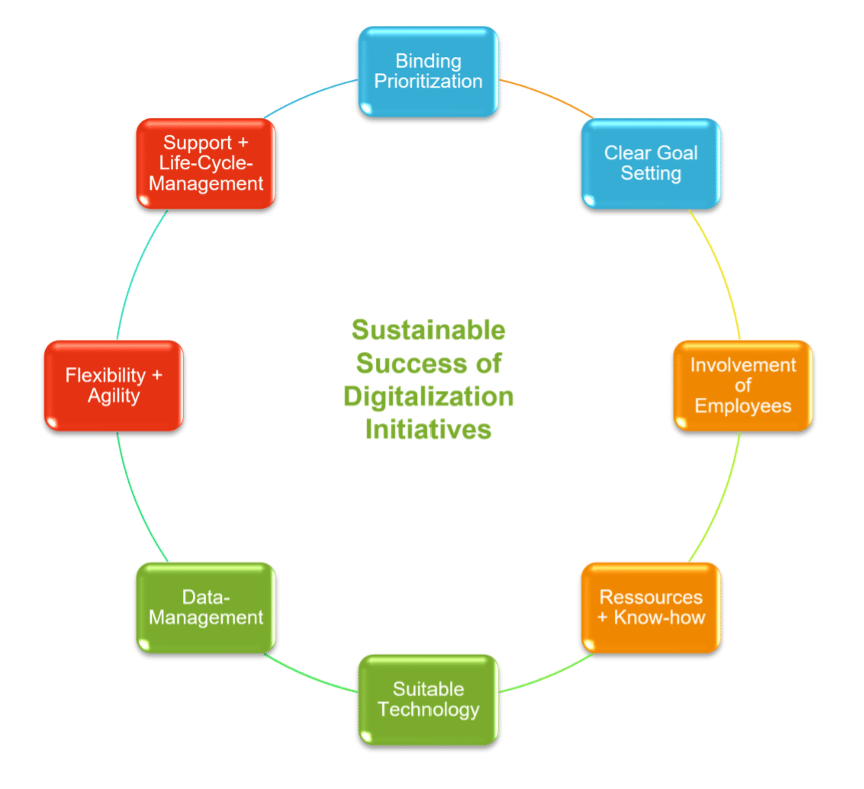Digitalization in Controlling: A Guide for the Future

In today’s dynamic business world, finance and controlling departments face numerous challenges: markets are changing rapidly, regulatory requirements are increasing, budgets need to be used more efficiently, and well-founded decision-making support should be possibly available in real-time. And all this ideally simultaneously and holistically.
This presents significant challenges for the departments and their organizations. Operational measures can’t be completely decoupled from strategic initiatives. Likewise, process optimizations in finance and controlling cannot be carried out independently of the rest of the organization’s value creation process. Digitalization offers enormous opportunities here but also has its pitfalls in the sustainable realization of these initiatives.
The Paradoxes of Digitalization
Digitalization is also a double-edged sword in controlling. It promises efficiency gains, cost reductions, and better decision-making foundations. At the same time, it also creates uncertainty and causes risks. Organizations must ask themselves: How can we leverage the benefits of digitalization without getting lost in the technical details? How do we manage to involve our employees while effectively integrating the new technologies?
The Challenge of Transformation
The transformation begins with the fundamental question:
“Where are we and where do we aim to go?”
Many companies have already taken the first steps towards digitalization in controlling, but the journey is far from finished. The introduction of new technologies such as end-to-end integrated process digitalization, artificial intelligence (AI), and big data requires more than just technical know-how: it requires a change in processes as well as new way of collaboration and corporate culture.
A Look into Practice
The role of the CFO and the head of controlling is crucial for the success of digital transformation. They must not only provide the necessary skills and resources but also create the conditions so that their functional departments can drive digital transformation while managing demanding day-to-day business. At the same time, the demands on controlling are continuously increasing. Financial metrics alone are no longer sufficient to competitively manage a company. Sales forecasts should be “predictive,” risks and opportunities both within the organization and in the external market environment must be incorporated into planning and analysis as best as possible, and sustainability metrics should also be considered.
Digitalization is Not an “End in Itself” and There Are No Patent Recipes
Digitalization in controlling and finance is not an “end in itself”. It is not about simply introducing digital technologies but about using them purposefully and sensibly to create real added value for the company. Digitalization should always be tailored to the specific needs and goals of the organization.
There are no patent recipes: every organization has its own challenges, structures, and targets. Therefore, individual solutions must be tailored to the specific needs and goals of the company. When planning, organizing, and implementing digitalization, the following aspects should be considered:
- Binding Prioritization: Support and prioritization by top management are crucial. Without clear binding prioritization and support from the top, it will be difficult to mobilize the necessary resources and employee commitment.
- Clear Goal Setting: Clearly defined goals and expectations are needed. What should be achieved with digitalization? Which processes should be optimized? What benefits are expected? Which metrics are crucial?
- Involvement of Employees: Acceptance and commitment of employees are crucial for success. Target group-specific empowerment through needs-based training and active involvement in the change process are essential.
- Resources and Know-How: Digital transformation requires significant resources and specific skills. It should be critically examined from the outset whether the necessary resources with relevant know-how are available both internally and externally.
- Suitable Technology: The market offers a variety of technical possibilities. It is important to select which technologies and tools fit the specific goals and requirements of the organization. Integration into the existing system landscape should also be considered.
- Data Management: Successful digitalization, especially for the controlling, requires effective data management. High data quality and analytical capabilities at both the system and employee levels are essential.
- Flexibility and Agility: Digital transformation is a continuous process. Organizations must be able to continuously adapt their strategies, systems, and processes to respond to changes in the market and technology.
- Support and Life-Cycle Management: Equally crucial for the success of digitalization is the successive support and life-cycle management of the implemented system solutions. New technologies require close collaboration between functional and technical support to be used sustainably and effectively by users.

Fig. 1 – Selection of Components for Sustainable Success in Digitalization (own illustration)
This comprehensive yet not exhaustive list shows that digitalization in controlling and finance is a complex and multifaceted task. The multitude of aspects that need to be considered presents significant challenges for organizations. Competent support from experienced experts can help to master these challenges and successfully implement digitalization. Experts can help develop needs-based solutions take into account the specific needs of the organization and thus make the realization process of digitalization efficient and sustainably successful, thanks to lessons learned and best practices from various projects.
Good to Know
Digitalization in controlling is not a trend but a necessity for organizations that want to remain competitive in today’s dynamic business world. With the support of our CA Consulting team and our partners, you can successfully shape this change and future-proof your controlling processes. CA Consulting offers comprehensive advice and support in the development and implementation of digital solutions in controlling:
Take advantage of the opportunities of digitalization and make your company fit for the future.

Author
Helene Eder
Manager, Consultant and Coach
at CA controller akademie



